hell

This is going to be a problem. This chapter on faith and science and quantum mechanics is going to be a problem. Why? Well, because this faith and science thing has been done to death. Did you know that the Vatican has an observatory and that one of the authors of Red Shift Theory was a Jesuit? Yep. The famed Scopes Monkey Trial was more than a century ago and those of us in the Protestant Mainline have long ago made peace with it. The Vatican apologized for the oppression of scientists, most specifically it said that Galileo was right. Scientific inquiry and Biblical interpretation are not the same thing. So what's Rob's purpose for this chapter?
Well, it's manifold. He's an evangelical. He's writing in some ways to other evangelicals, specifically those who have felt cut off from the tradition. Here in the States, the classic evangelical line holds echoes of the arguments used during the Scopes Monkey Trial. Some in that Christian tradition are still fighting that fight. Heck, some progressives are, too. Powerful (if false) dichotomies have been established.
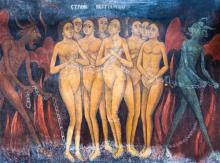
Yesterday, I discussed some of the historical bases for our contemporary understanding of Satan. Today, I’ll consider how hell evolved as part of the Christian faith.
In Old Testament scripture, the resting place for the dead is called Sheol. While some believe this is the same as hell, there are indications to the contrary. In the ancient Jewish tradition, Sheol is a place of rest for both righteous and wicked, with no distinction.
Not everyone is happy about it either.
In the third chapter of Malachi, the prophet recognizes the consternation of faithful Jews who are frustrated that the wicked share the same fate. In Ecclesiastes, the priest Koheleth claims that serving God is vanity. For him, the fact that the righteous are treated the same as the wicked and vice-versa should be a call to eat, drink and be merry.
With respect to any relationship between Satan in the Old Testament and Sheol, there is none.

(I was invited to take part in a debate about hell at a university recently, but unfortunately, the dates don’t work with my schedule this time. But since it’s an interesting topic, and one about which many folks have questions, I thought I’d share a couple of short essays I’ve written on the subject.)
While Jonathan Edwards wasn’t the first to preach about hell and condemnation, his ‘Sinners in the Hands of an Angry God’ sermon in 1741 crystallizes the beginning of a modern movement in the church. Edwards employed fear of punishment as a primary means for conversion and doctrinal adherence. Meanwhile, his congregants fainted in the aisles and clung to the pews to avoid being dragged down into the abyss.
We can argue day and night about whether fear-based theology is effective, biblically accurate, or even necessary. But it’s worthwhile to consider where our contemporary ideas about hell and Satan even come from.
Today, we’ll begin with Satan; we’ll save hell for tomorrow.

IF IT WASN'T the year from hell for the North American continent, it was the year from a place with a very similar temperature.
It's hard to remember, but it began with that bizarre summer-in-March heat wave that meteorologists described as one of the most anomalous weather events in the country's history. Before long there were record blazes burning in Colorado and New Mexico, and then a stifling heat wave moved east, triggering a "derecho" storm that raced almost 1,000 miles from Indiana to the Atlantic and left 5 million without power. July was the hottest month ever recorded in the United States; it was also when drought descended full force on the Midwest, stunting corn and soybeans and driving the world price of grain up by 40 percent (and making sure our hellish year became traumatic for poor people the planet round). By August it was clear we were in for a record melt year in the Arctic; when the long polar night finally fell, it was clear we'd essentially broken one of the planet's biggest physical features. And all that was before Sandy piled into our greatest urban area, leaving behind an indelible image of the future.
So the question becomes, what's an appropriate response? What even begins to match the magnitude of the trouble we face? What doesn't seem like spitting in the wind?
My sense is that the time has come to take on the fossil fuel industry itself—not the members of Congress they buy in droves each election season, but the real powers. Ignoring the damage they've already caused, these people spend hundreds of millions of dollars each day looking for new fossil fuels. And they spend hundreds of millions each year making sure no government stops them. They're like the tobacco industry at this point, except that instead of going after your lungs they're going after the lungs of the planet.
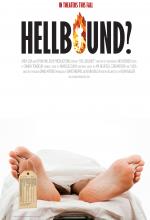
I first heard about the movie “Hellbound?” (coming out this fall) at Wild Goose Festival. They were offering an advance screening of the movie, and although I was just passing by the tent at the time, the subject matter stopped me where I was. A thoughtful, well-researched, accessible discussion about the history, purpose, and prospects of hell in Christian theology?
I’m in!
The film opens with reflections on September 11th, including a 10-year anniversary memorial event at the site. And as would be expected, the infamous picketers from Westboro Baptist Church were there, complete with signs bearing slogans like “Thank God for 9/11″ and, of course, “God Hates Fags.” The movie progresses to, let’s say, more educated points of view, focusing more on the front end on those who advocate for a real hell that is populated with innumerable souls experiencing eternal conscious torment.
But then the movie breaks off from the oft-quoted pro-hell camp and considers the social and historical backdrop for hell, as well as extensive screen time for the doubters and skeptics about the reality of such a place. Folks offering counters to the “traditional” evangelical view of hell include Brian McLaren, Frank Schaeffer, and an Eastern Orthodox priest, all offering fascinating tidbits meant to expand our understanding of where this modern-day understanding of hell even came from, let alone whether we claim a God who would send people there.

The film picks up on the recent media buzz generated by Rob Bell's controversial bestselling-book Love Wins, taking that debate into new levels of intelligence and depth.
Like any good documentary, we have the entertaining attention grabbing parts, which aren't hard to find when your topic is Hell and damnation:
We meet people at a death metal concert, take a tour through "Hell House" where actors attempt to traumatize teens into the kingdom by reenacting scenes from Columbine. Then there are the street interviews with the rather obviously mentally unstable and angry folks from Fred Phelps' church, holding their "God Hates Fags" signs and screaming at anyone who passes by.
The movie quickly moves beyond this however, delving into the deeper issues at hand. Unlike so many other Christian films, Hellbound? is neither sentimental nor sensationalist. The word that comes to mind instead is depth.

After writing up my first list of Ten Cliches Christians Should Never Use, some folks wrote me with other suggestions. After simmering on it for a while, I came up with a second list of ten to supplement the first.
And as there was some confusions from a handful of fellow Christians about the intent of the articles: these are not intended to tell you to believe or not believe a certain set of things. Christians have a Public Relations problem; that much is self-evident. So in as much as I can respond to that, I want to offer these as advice on how to change the way we approach people about our faith.
On to the next ten cliches for Christians to avoid …
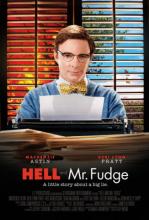
ATHENS, Ala. — Black and white. Heaven and hell. Right and wrong.
Blur or question those lines, and, well, all hell can break out.
At least it did for Edward Fudge in the early 1980s in in this small northern Alabama hamlet.
Fudge was a young preacher who also worked in his father's publishing company. When he began to teach a doctrine of hell that contradicted the traditional view of a place of eternal fiery torment for the damned, a quick succession of events cost him his job and his pulpit.
A new film, Hell and Mr. Fudge, compresses the events of the years when Fudge, now a Houston-based lawyer and internationally known Bible teacher and author, began an intensive study of the Bible and the doctrine of hell. What he found made him question one of the bedrock doctrines of Christianity.

“Talk to me about your mother.”
Such ominous words.
But talk to you about her, I will. And it's not gonna be pretty.
You see, my mother isn't perfect. Her love may be perfect, but she's not and like everyone else on the planet she has hurt the ones she loves the most in the very act of trying to love them.
It's Mother's Day this Sunday and we'll honor our mothers, grandmothers, sisters, aunts, spouses, grandmothers and, and, and...We'll honor women and men who have mothered us. And we should.
It's not easy work and Lord knows that Freud has helped us pathologize motherhood. In turn we have idolized motherhood and mothers. Neither approach works. Not really. So I would like to propose a via media for Mother's Day.
Every Sunday as I'm driving to the church I serve I call my mother to check in. She lives by herself and I worry. I'm her son. I can't help myself.

 This past spring break, I took my 14-year old daughter to the Illinois Holocaust Museum and Education Center.
This past spring break, I took my 14-year old daughter to the Illinois Holocaust Museum and Education Center.
My daughter has had a difficult middle school experience, especially these last two years. This last year, we have both, in describing it, used the word “hell.”
We have been frequently at odds in these months, my daughter and me. I often feel that I have failed her, that I have failed myself.
One point of connection has been her explorations around World War II and the Holocaust. She has read books about it — novels, mostly. We have watched movies that, in my naiveté, I didn’t imagine she would watch for a while. There have been questions, discussions, recollections of stories her grandfather, a WWII vet who is now deceased, once shared with her, with me. There have been nightmares, too, where I wonder if we are, yet again, making the best choices in our twisting, turning journey through this year, this path.
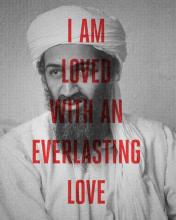
I’m sipping on a root beer at Barnes & Noble as I work on my revisions for Forest Life. In the meantime I’ve noticed a handfull of debates raging over this photo that has been spreading around the Internet today. This makes sense given that today is the one year anniversary of the killing of Osama bin Laden.
Of course thinking people know that his death did not bring about any worthwhile social change.
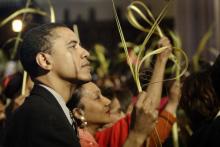
Editor’s Note: At 3:30 p.m. on Saturday, March 27, 2004, when I was the religion reporter for the Chicago Sun-Times, I met then-State Sen. Barack Obama at Café Baci, a small coffee shop at 330 S. Michigan Avenue in Chicago, for an interview about his faith. Our conversation took place a few days after he’d clinched the Democratic nomination for the U.S. Senate seat that he eventually won, and four months before he’d be formally introduced to the rest of the nation during his famous keynote speech at the 2004 Democratic National Conventio.
We spoke for more than an hour. He came alone. He answered everything I asked without notes or hesitation. The profile of Obama that grew from the interview at Cafe Baci became the first in a series in the Sun-Times called “The God Factor,” which would eventually became my first book, The God Factor: Inside the Spiritual Lives of Public People, in which Obama and 31 other high-profile “culture shapers” — including Bono of U2, Nobel Laureate Elie Wiesel, the author Anne Rice and President George W. Bush's speechwriter Michael Gerson — are profiled.
Because of the seemingly evergreen interest in President Obama’s faith and spiritual predilections, and because that 2004 interview remains the longest and most in-depth he’s granted publicly about his faith, I thought it might be helpful to share the transcript of our conversation — uncut and in its entirety — here on God’s Politics.
~ Cathleen Falsani
My friend, Harry Jackson, said that my ideology isn't "Christian" but I suspect what he really means is that it isn't Republican and that's why he disagrees with the things I have said. It's important for Christians to understand those aren't the same thing. I think Bishop Jackson's economic ideology that is indistinguishable from Republican and Tea Party talking points, but I would rather have a civil discussion together as Christians about our differences; rather than his accusing Christians who don't share his conservative economic opinions as coming from "the councils of Hell." C'mon, Harry. I believe the Bible's teachings on wealth and poverty challenge both Republican and Democratic economic views which, sadly, are both often sold out to the interests of the wealthy and large corporations, when they should be focused on the ones Jesus calls "the least of these." Can we discuss that Harry?
The evangelical world expands to a far-off horizon and the topographical valleys and peaks cover landscapes that are both long and wide. Many in the media seem to have little knowledge of how large of a space the evangelical map covers. So, with this said, I welcomed Ross Douthat's thoughts in Monday's New York Times. His column, "American Theocracy Revisited," places good markers on the fears that Rick Perry and Michelle Bachmann's presidential runs are nothing more than an attempt at theocracy.
In much of the coverage of these two campaigns, the evangelical world gets flatten, stereotyped, and portrayed as only coming from one narrow point. Whether or not you agree with this view, the fact remains that any group that includes Miroslav Wolf, Jim Wallis, RC Sproul, Rick Warren, Joyce Meyers, Philip Yancy, Chuck Missler, Rob Bell, Albert Mohler Jr, TD Jakes, Amy Grant, Tony Campolo, Lucy Swindoll, Debrah Joy Winans, and so many more hues and colors of evangelicalism should not be placed in one bag and shaken into one lumpy mess, while saying that any one of their diverse views politically are the one true color. I know many will view this list and say who should or should not belong, and then justify their choices. A coherent political agenda could not be drawn from such a list of people. But following Jesus and making Jesus known in the world is at the core of each of these people's identity. Many on the list may disagree as to the best way to provide for the widows and orphans, but all would agree that we must care for them.
Editor's note: "Voices From the Gulf" is a series of posts from people experiencing first-hand the devastating effects of the worst oil spill in American history. Check back often for more stories each week.
I had the recent pleasure of seeing Max McLean's deliciously wicked portrayal of Screwtape in The Screwtape Letters currently playing at the Westside Theater in New York City. By employing some sound and lighting effects, this production gave a contemporary spin on C.S. Lewis' classic tale of a quest to slowly guide a man into hell.
